In B2B marketing, keyword research is the process of identifying valuable search terms that potential customers use to find products and services. This targeted approach allows businesses to optimize their online presence and connect effectively with their audience. Without an effective keyword strategy, you risk missing out on valuable opportunities.
Therefore, understanding B2B keyword research is essential because it drives traffic to your website and also helps enhance conversion rates. It enables marketers to align their content with the buyer’s journey while addressing their specific needs.
In this simple guide, we will skim through five essential strategies for effective B2B keyword research, including:
- Understanding what your audience is looking for
- Studying what keywords your competitors use
- Using terms specific to your industry
Let’s learn why having a smart strategy for B2B keyword research is so important.
The Importance of Keyword Research in B2B Marketing
Keyword research helps you create content that shows up in search engine results, which makes it easier to reach B2B customers.
In fact, a 2023 Statista study found that 66% of B2B buyers in the U.S. discovered new products through search engines.
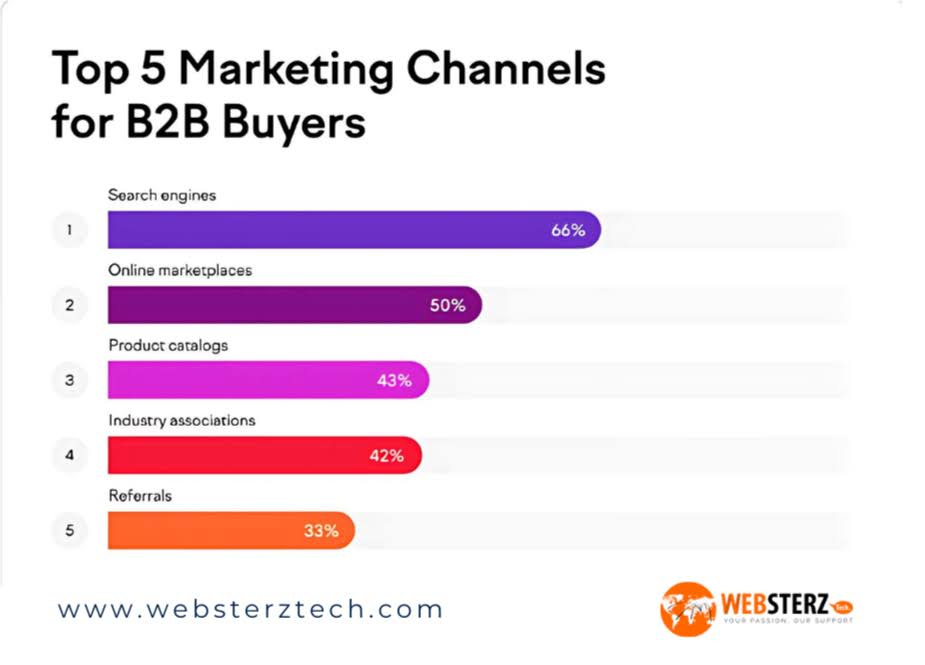
Image Data Source: Statista
Good keyword research gives you plenty of ideas for content and helps you understand what your target audience is searching for.
This insight allows you to create more relevant content and improve your overall marketing efforts, which can lead to better visibility and more customer engagement.
How Is Keyword Research Different in B2B Marketing?
- Terminology differences: B2B companies usually have their own special terms, but buyers might not know these words or use them when searching online.
- Lower search volume: B2B keywords usually get fewer searches than B2C keywords because they are more specialized. This means even if you rank for them, it may not bring a large increase in website traffic.
- Longer decision-making process: B2B buyers usually take more time to make purchasing decisions, which can lead to lower immediate conversion rates.
5 Easy Tips for Effective B2B Keyword Research

1. Find Ideas in Industry Communities and Resources
Forums are great places to learn about common issues in your industry. People often visit forums to ask questions or seek advice from other professionals.
For example, you might check out a Reddit group related to your field to discover keyword ideas. Many posts can reveal the struggles your target audience is facing. If someone asks about doing keyword research for a local service business, it shows there’s a demand for that topic.
For example, the user below is seeking help with keyword research for a local service business.
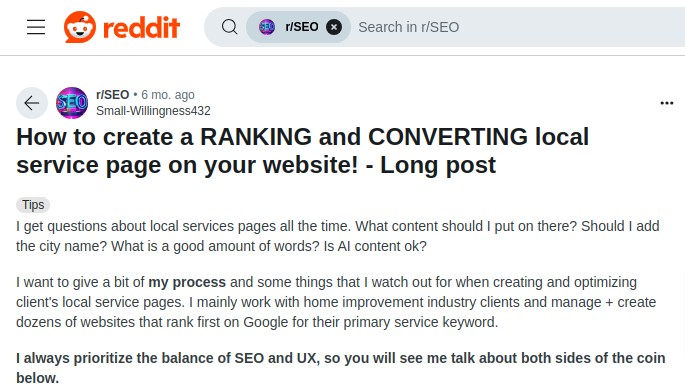
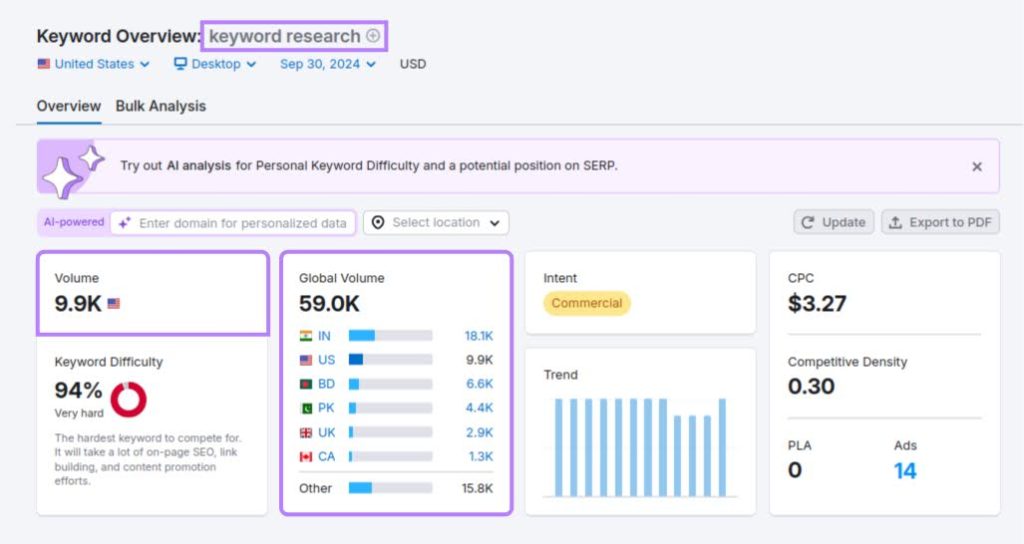
So, start by joining relevant groups on forums like Reddit and Quora, as well as any industry-specific forums your target audience frequents.
You can also find valuable B2B keyword ideas from other industry resources that highlight important topics and terms in your field. Here are some useful resources to explore:
- Conference agendas
- Product Documentation
- Competitor’s white papers
- Industry reports
2. Build a Keyword List
The keywords you have gathered are known as seed keywords. These are short phrases closely related to your B2B business. Seed keywords form the foundation of your keyword strategy and should reflect your website’s main topics. You can use them to find more specific Keyword Magic Tools.
To expand your list, use a keyword research tool. Enter one of your seed keywords, your website URL, and your target location, then click “Search.”
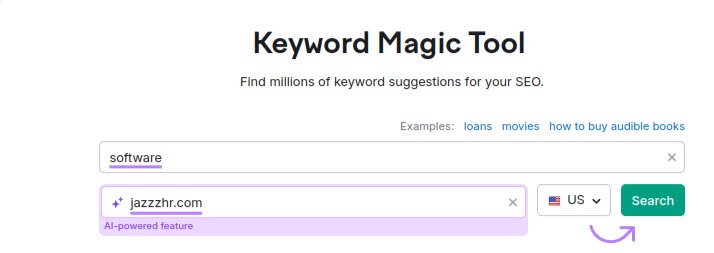
When the results appear, look through the keywords to find ones that are especially relevant to your business.
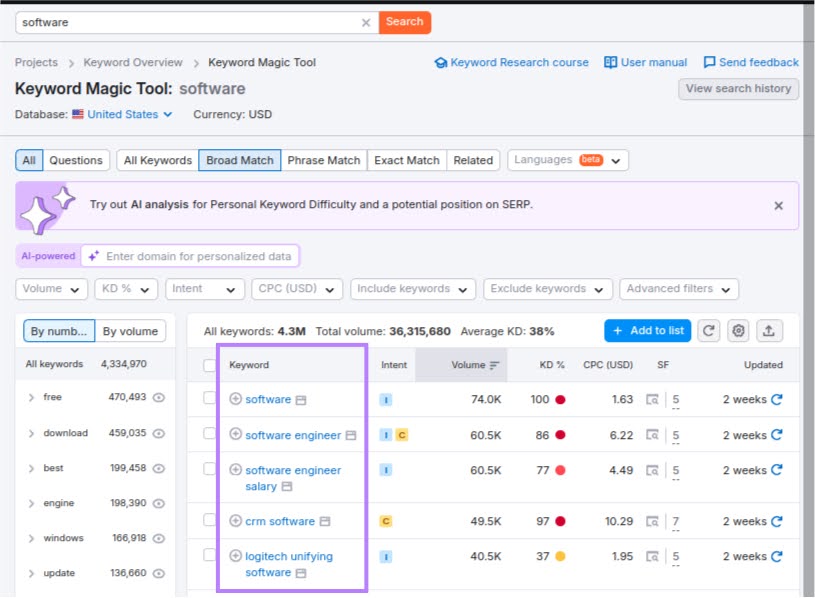
3. Discover Keywords Your Competitors Are Using
You can discover valuable keyword ideas by looking at the keywords your competitors rank for. If a competitor is successfully ranking for a specific term, it’s probably a good opportunity for your business, too.
If you know who your competitors are, great! If not, start by entering your website’s domain into a keyword research tool. Navigate to the “Organic Research” section, click on the “Competitors” tab, and scroll down to see a list of your competitors.
By analyzing their keywords, you can identify terms that could also work for you. This approach helps you find gaps in your own keyword strategy and spot opportunities to attract more traffic.
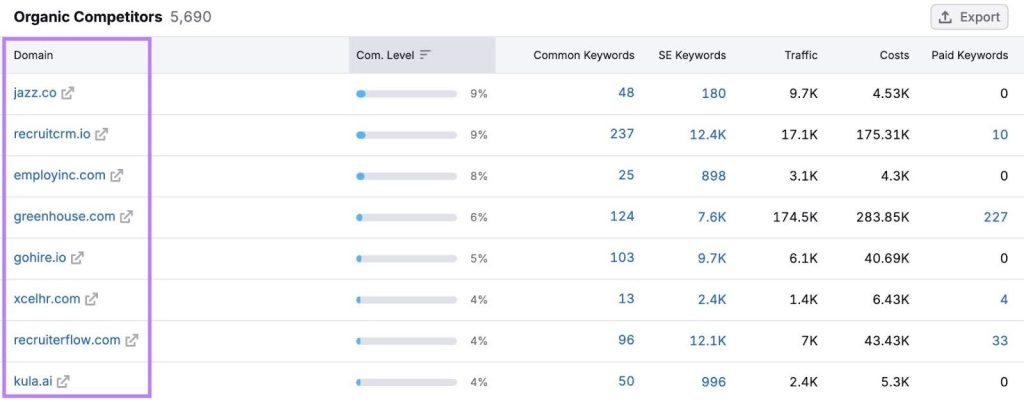
You will now see a list of your main competitors in organic search.
With this list of competitors, you can use the Keyword Gap tool to find out what keywords they are using.
Start by entering your website’s homepage URL in the first box. Then, add your competitor’s domains in the boxes below.
Make sure to select your target location, and then click “Compare.”
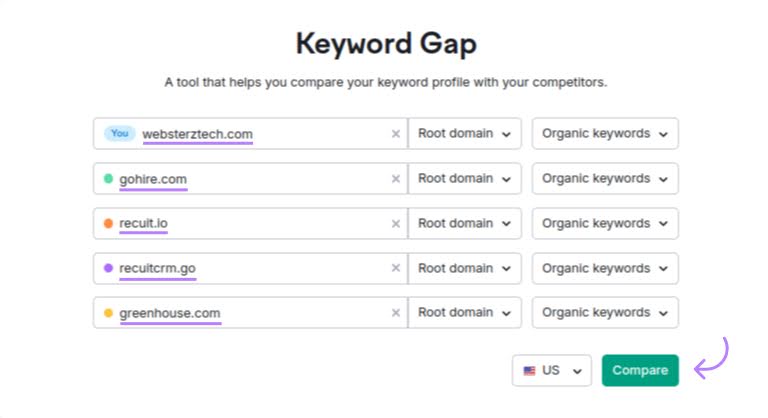
Next, scroll down to the “All keyword details for:” section. Here, you will find different tabs that provide information about your competitor’s keywords. Click on the “Missing” tab.
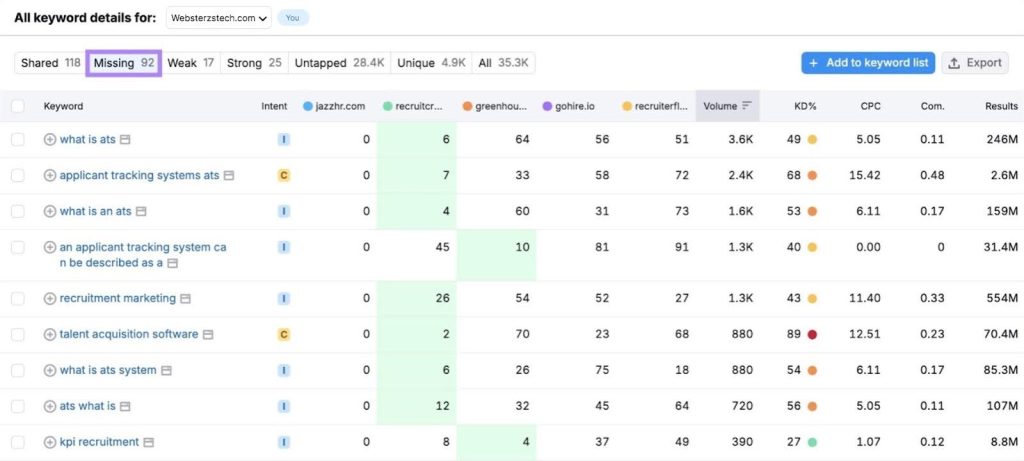
This section displays the keywords your competitors are ranking for that your website is not.
If you find any relevant keywords, consider adding them to the lists you have already created by using the checkboxes. This way, you can include these valuable terms in your keyword strategy.
4. Group Keywords Into Topic Clusters
A topic cluster is a group of related pages that focus on a specific theme. This structure helps to improve your SEO and shows authority in a particular area.
In a topic cluster, there’s a main page (called a pillar page) that covers a broad topic, like a seed keyword. Connected to this are subpages that focus on more detailed or specific keywords (long-tail keywords).
Each subpage targets a group of similar terms, known as a keyword cluster. These terms all relate to the same idea, such as “CRM software,” “CRM tool,” and “CRM platform.”
This structure creates a network of related content, which helps both search engines and users find relevant information easily.
Here’s an example of what a cluster model looks like:
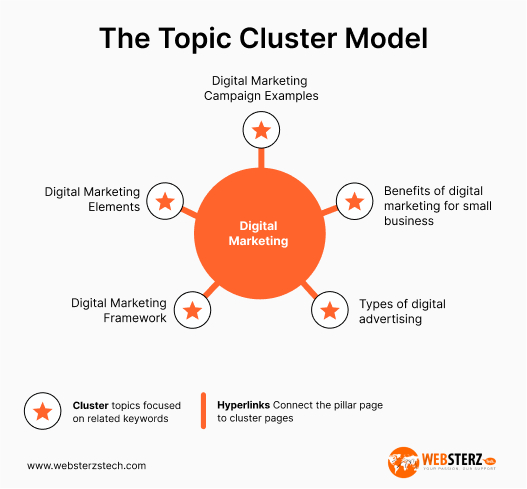
Topic clustering works especially well for B2B websites because it helps to demonstrate your expertise to an audience that knows the industry well.
Use keyword strategy builder for topic clustering.
Scroll down and select one of the lists you created earlier.
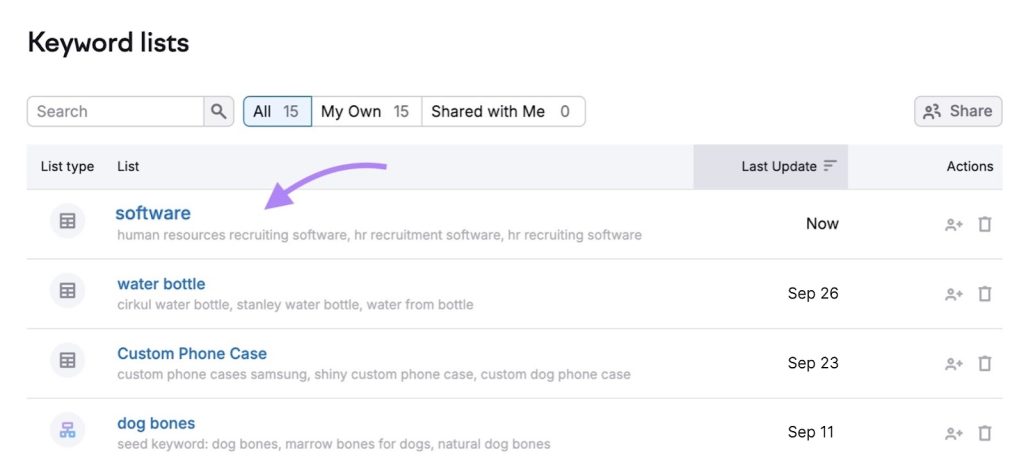
In the table that appears, select “Cluster this list” at the top.
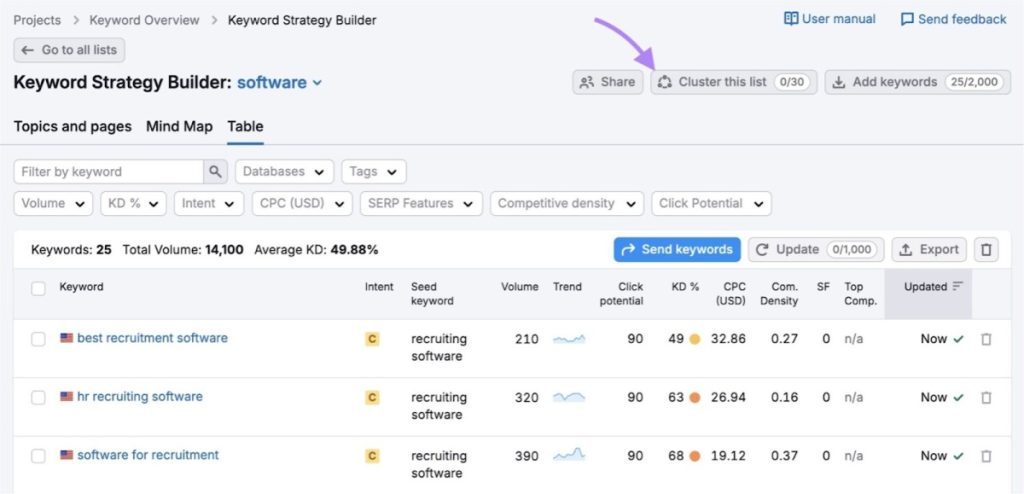
Once the tool is done, you will be directed to the “Topics and Pages” tab, where you will find ideas for subpages within your topic cluster. The seed keyword serves as the main topic for your pillar page.
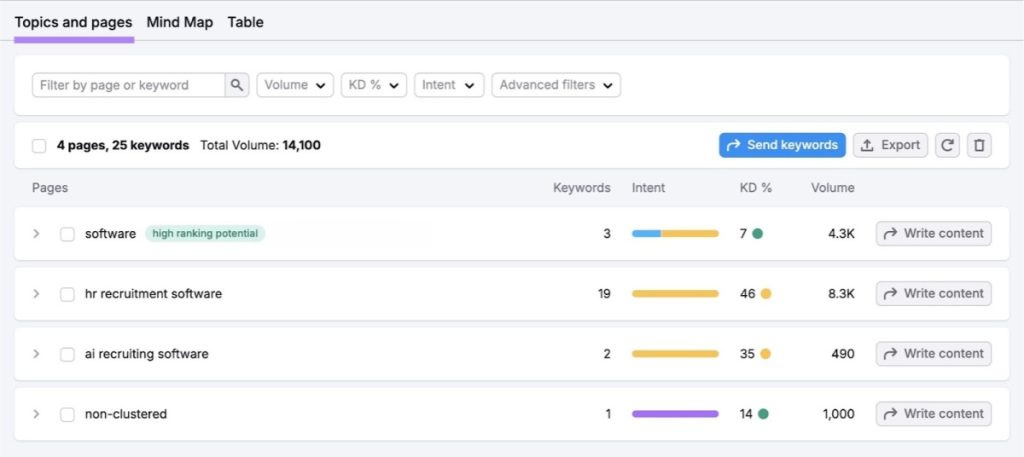
When you click the arrow next to any page, it opens up to display all the keywords related to that page’s topic, which makes it easier to view the entire keyword cluster.
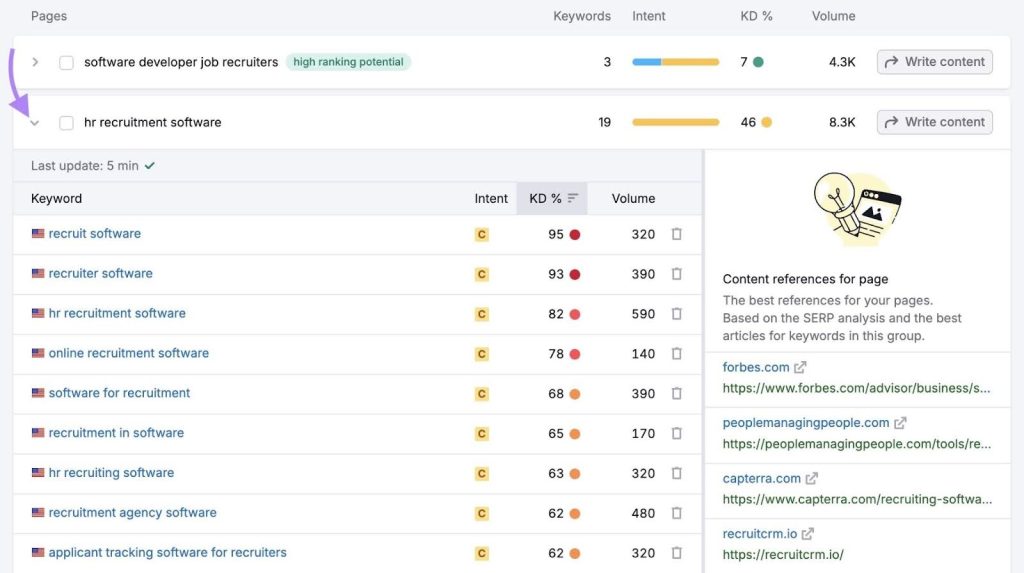
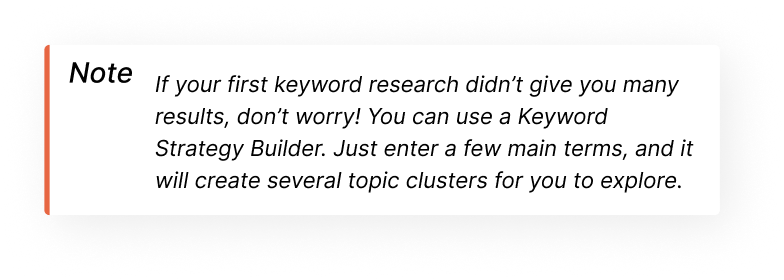
5. Focus on the Best Keywords for Your Business
After gathering a long list of keywords, it’s time to focus on the ones that can benefit your B2B business the most. Start by creating content for these top keywords.
To analyze a keyword, pick the main keyword from one of the clusters you created earlier. Then, enter it into the Keyword Overview tool and add your website’s domain in the“AI-powered box.”
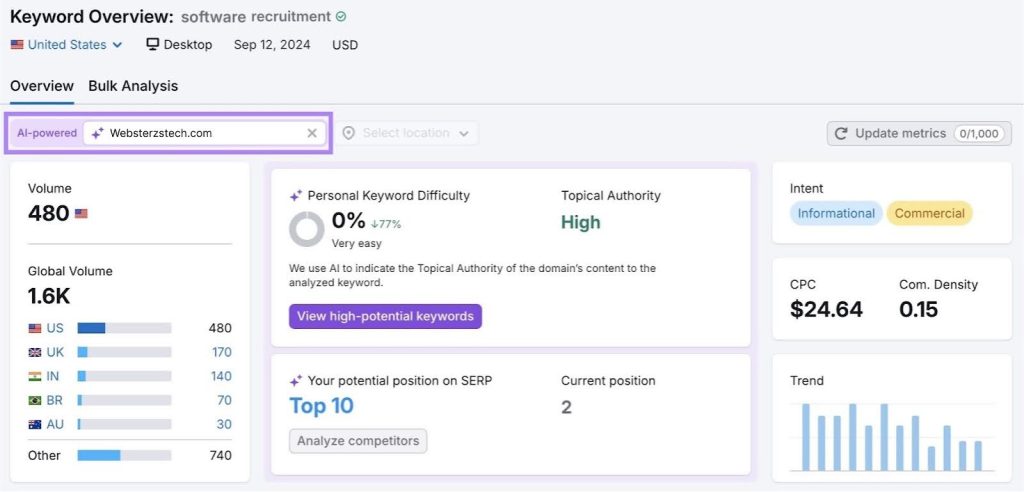
Keyword Analysis Metrics
Once you have your keyword, use these important metrics to see how well it can work for you:
- Volume: This shows how many times people search for the keyword each month on average over the last year. Look for keywords with a reasonable number of searches.
- Keyword Difficulty: This indicates how hard it is for your website to rank in the top 10 search results for that keyword. Aim for keywords with a difficulty score below 50% for a better chance of ranking well.
- Topical Authority: This measures how relevant your website is to the keyword. You want this to say "High" or "Relevant."
- Cost per Click (CPC): This tells you how much advertisers pay for each click to rank at the top of search results. A high CPC often means the keyword is valuable and can lead to conversions.
Use these metrics to decide which keywords to focus on first. This will help you start seeing results from SEO faster.
As you create more content and your website gains authority, keywords that seem too difficult now may become easier to rank for later.
So, check your keyword clusters regularly to find new keywords to target.
Implementing these strategies, you will be set to develop a strong B2B keyword strategy that drives traffic and connects with your target audience effectively.






